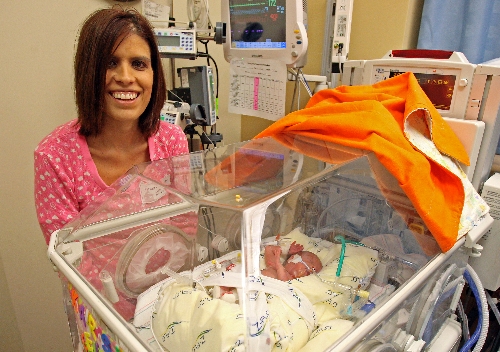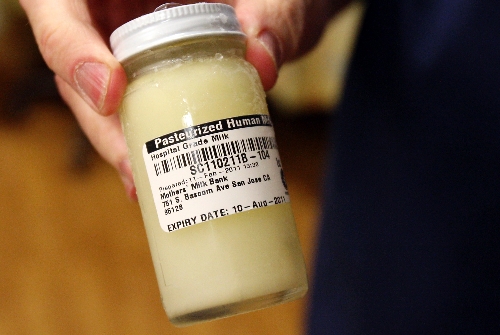Breast milk donated in California helps premature baby in Las Vegas


As tiny Karsyn Saddler lies in an incubator at St. Rose Dominican Hospital’s Siena campus, breast milk fed to the premature infant through a tube helps sustain her life.
The milk does not come from her mother but from a milk bank in San Jose, Calif.
"I’m so glad the hospital worked with me on this," said Kari Molnar, the child’s mother and a Las Vegas attorney. "My sister’s in medical school, and she knew I wasn’t well enough to have breast milk of my own. But she wanted my baby to have it because she’s sure she’ll do much better on it. Karsyn wasn’t tolerating the formula well."
The roots of donor milk banking reach back to the earliest of times, when children not breast fed by their mothers might be breast fed by relatives, friends or strangers, a practice known as "wet nursing."
But the fear of disease transmission, coupled with an increase in the popularity of formula products, largely ended the practice in the late 20th century.
"For a long time, hospitals didn’t think it was that big of a thing for someone to donate breast milk. There were even informal milk banks around until the 1980s," said Suzie Owens, a certified lactation consultant for St. Rose. "But then AIDS came in and changed all that."
Since then, medical professionals — mindful that breast feeding helps a newborn in many ways, including providing optimal nutrition, protection against disease and easy digestibility — have started formal milk banks around the country that carefully screen donors for disease much like blood banks.
There are now 10 nationwide, and the one in San Jose is the closest for patients in Southern Nevada.
"We had been trying to get a policy in place on this issue for some time," said Scott Rolfe, manager of the Neo Natal Intensive Care Unit at St. Rose, where Karsyn has spent the first five weeks of her life. "We finally got everyone together on Friday."
On Saturday, Federal Express delivered little bottles of the breast milk from a mother who donated her milk after giving birth to a premature infant of her own. The breast milk is supplemented by other nutrients given to Karsyn.
"She made history of a kind here," Rolfe said as he peered at the baby, who weighed just 2 pounds and measured 14 inches when she was born Jan. 19. She is now 3 pounds. "Our sister hospital (St. Mary’s) in Reno does this, but it’s still very unusual in Nevada."
The Valley Medical System and University Medical Center have not used a breast milk donor bank. Ashlee Seymour, a spokeswoman for Sunrise Hospital and Medical Center, said the hospital has had access to a milk donor supplier in Texas.
It’s incredible, said Kari Molnar, that a discussion about her and her daughter at the hospital is centering on breast milk rather than their deaths.
Molnar, who suffers from Crohn’s disease, a form of inflammatory bowel disease that usually affects the intestines, remains hospitalized today after emergency surgery for a perforated bowel.
She didn’t learn she was pregnant until Jan. 12, when she went to the hospital for pain in the abdominal and lower back area.
"I had lost so much weight from the Crohn’s disease, I just didn’t think I could be pregnant," said Molnar, whose fiance, Andrew Saddler, was working a construction job Monday. "Here I was, 6½ months pregnant, showing up at a hospital, and not knowing it. Unbelievable."
After a few days at home in mid-January and unable to shake the pain that sent her to the hospital, Molnar ended up back in St. Rose on Jan. 19. This time, her stomach had swelled to double its size and she was vomiting brown fluid.
Doctors came to realize her bowel had probably ruptured. They knew, she said, that with the intestinal procedure they had to perform on her, it was likely her baby would not survive unless she was delivered by Caesarean section.
"But they knew if they did the C-section right away it would probably kill me," she said, fingering her pink pajamas.
Doctors took out part of Molnar’s intestine and three hours later did a C-section. Molnar was made extremely weak from both procedures, but on this day she only wants to talk about keeping her daughter alive.
"Karsyn wasn’t breathing at first," Molnar said as she struggled to stand up alongside her bed. "But they got her going, and she’s doing great now on a ventilator. I think she’s going to make it."
Karsyn was just 26 weeks when born. A normal pregnancy is around 38 weeks.
Molnar’s parents, Cindy and Rich Molnar, came from their Florida home to be with their daughter.
"We have two miracles in one family," Rich Molnar said as he pushed his daughter in a wheelchair on the way to see Karsyn. "Two miracles is pretty good."
Contact reporter Paul Harasim at pharasim@review journal.com or 702-387-2908.












